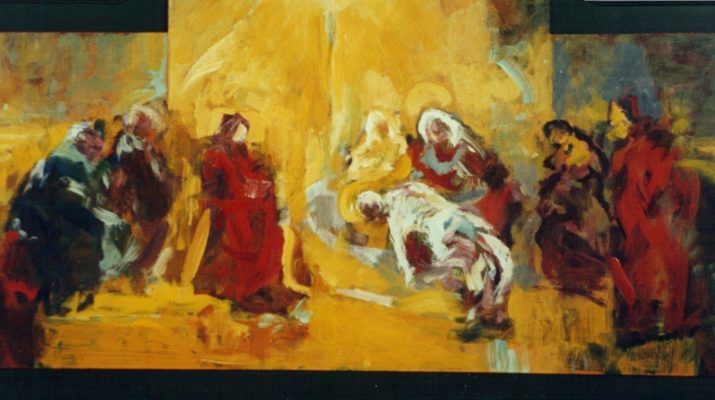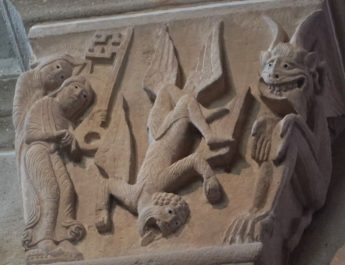Mark 14:32-36
NL 203
14:32 They wentI to a placeII calledIII Gethsemane;IV
I “went” = erchomai. This is to come or go.
II “place” = chorion. 10x in NT. From chora (space, land, region, fields, open area); from chasma (gap, gulf, chasm, open space); from chasko (to gape, yawn). This is place, estate, possession, piece of ground, property.
III “called” = onoma. May be from ginosko (know, recognize, learn from firsthand experience). This is a name, authority, cause, character, fame, reputation. The name was thought to include something of the essence of the person so it was not thought to be separate from the person.
IV “Gethsemane” = Gethsemani. 2x in NT. From Hebrew gath (wine press); {perhaps from nagan (to strike a stringed instrument, to pluck or play it)} + shemen (fat, oil, grease, olive oil – often with perfume; figurative for fertile, lavish, rich); {from shamen (to shine, which implies being oily, growing fat)}. This is Gethsemane, meaning oil-press, an olive orchard.
and he saidV to his disciples,VI “SitVII here while I pray.”VIII
V “said” = lego. This is to speak, say, name, call, command. It is generally to convey verbally.
VI “disciples” = mathetes. From matheteuo (to make a disciple of); from manthano (to learn key facts, gain knowledge from experience; generally implies reflection as part of the learning process); from math– (thinking things through). This is a disciple, learner, or student. It is where we get “mathematics” from.
VII “sit” = kathizo. From kathezomai (to sit down, be seated); {from kata (down, against, according to, among) + hezomai (to sit); {from aphedron (a seat, a base)}}. This is to sit, set, appoint, stay, rest.
VIII “pray” = proseuchomai. From pros (advantageous for, at, toward) + euchomai (to wish, make a request, pray). This is to pray or pray for, to worship or supplicate. It is more literally exchanging one’s own wishes for God’s.
33 He tookIX with him PeterX and JamesXI and John,XII
IX “took” = paralambano. From para (beside, by, in the presence of) + lambano (active acceptance/taking of what is available or what has been offered; emphasizes the choice and action of the individual). This is to receive, take, acknowledge, associate with. It can also mean to take on an office or to learn.
X “Peter” = Petros. Related to petra (large rock that is connected and or projecting like a rock, ledge, or cliff; can also be cave or stony ground). This is Peter, a stone, pebble, or boulder.
XI “James” = Iakob. From Hebrew Yaaqov (Jacob); from the same as aqeb (heel, hind part, hoof, rear guard of an army, one who lies in wait, usurper). This is James, meaning heel grabber or usurper.
XII “John” = Ioannes. From Hebrew yochanan (Johanan); from Yehochanan (“the Lord has been gracious”); {from YHVH (proper name of the God of Israel); {from havah (to become); from hayah (to be, exist, happen)} + chanan (beseech, show favor, be gracious; properly, to bend in kindness to someone with less status). This is John, meaning “the Lord has been gracious.”
and beganXIII to be distressedXIV and agitated.XV
XIII “began” = archomai. From archo (to rule, begin, have first rank or have political power). This is to begin or rule.
XIV “be distressed” = ekthambeo. 4x in NT– 1x when Jesus healed a boy with a spirit and the crowd was overcome with awe in Mark 9:15, 1x when Jesus was distressed at Gethsemane in Mark 14:33 & 2x when Mary Magdalene, Mary, and Salome were alarmed at seeing the angel at the empty tomb and the angel says, “do not be alarmed” in Mark 16:5-6. From ekthambos (amazed, filled with wonder that affects the viewer greatly); {from ek (from, from out of) + thambos (amazement, wonder, being stunned or dumbfounded because something unusual happened; it can be positive or negative); {akin to tapho (dumbfounded)}}. This is to amaze, be full of awe, to be distressed.
XV “agitated” = ademoneo. 3x in NT. Perhaps from adeo (to be full to the point of loathing). This is being distressed, troubled, fearful, lacking courage.
34 And he said to them, “IXVI am deeply grieved,XVII even to death;XVIII remainXIX here, and keep awake.”XX
XVI “I” = psuche. From psucho (to breathe, blow). This is breath, the breath of life, the self, individual, soul. This is the word for that which makes a person unique – their identity, will, personality, affections. This isn’t the soul as the immortal part of us, but as our individuality. It is also not life as a general concept, but specific to people. This is where the words psyche and psychology come from.
XVII “deeply grieved” = perilupos. 5x in NT– including 2x when Jesus prays in Gethsemane in Matthew and Mark. From peri (about, concerning, all around, encompassing) + lupe (pain, whether physical or mental; grief, sorrow, distress, a heavy heart). This is very sorrowful, deeply grieved.
XVIII “death” = thanatos. From thnesko (to die, spiritually or literally). This is death, whether literal or spiritual. It can also refer to something that is fatal.
XIX “remain” = meno. This is to stay, remain, wait, await, continue, abide, endure. It can mean to literally stay in a place or to remain in a condition or to continue with hope and expectation.
XX “keep awake” = gregoreo. From egeiro (to awake, raise up or lift up; to get up from sitting or lying down, to get up from sleeping, to rise from a disease or from death; figuratively, rising from inactivity or from ruins); probably from agora (assembly, forum, marketplace, town square, thoroughfare); from ageiro (to gather). This is to be or stay awake, watch. Figuratively, it can be alertness or vigilance.
35 And going a littleXXI farther,XXII he threwXXIII himself on the groundXXIV
XXI “little” = mikros. This is small in reference to a size or the number of something, least or less. Figuratively, it can refer to little dignity.
XXII “going…farther” = proerchomai. Related to “went” in v14:32. 9x in NT. From pro (before, earlier, above) + erchomai (see note I above). This is go on ahead, advance, precede.
XXIII “threw” = pipto. This is to fall literally or figuratively.
XXIV “ground” = ge. This is earth, land, soil, region, country, the inhabitants of an area.
and prayed that, if it were possible,XXV the hourXXVI might passXXVII from him.
XXV “possible” = dunatos. From dunamai (to be able, have power or ability). This is mighty or powerful. It speaks of ability of persons, possibility of things. It is what can be given the power or ability that the subject exhibits. The root verb is also related to miracles i.e. deeds of power.
XXVI “hour” = hora. This is a set time or period, an hour, instant, or season. This is where the word “hour” comes from.
XXVII “pass” = parerchomai. Related to “went” in v14:32 & “going…farther” in v14:35. From para (from beside, by) + erchomai (see note I above). This is pass by, neglect, disregard. Figuratively, it can mean to perish or to become void.
36 He said, “Abba,XXVIII Father,XXIX for you all thingsXXX are possible;
XXVIII “Abba” = Abba. 3x in NT. From Aramaic ab (father); corresponding to Hebrew ab (father in a literal or figurative sense – grandfather, chief, ancestor). This is abba, which means father – not a diminutive daddy.
XXIX “Father” = pater. This is father in a literal or figurative sense. Could be elder, senior, ancestor, originator, or patriarch.
XXX “all things” = pas. This is all or every.
removeXXXI this cupXXXII from me; yet, not what I want,XXXIII but what you want.”
XXXI “remove” = paraphero. 4x in NT. From para (beside, by, in the presence of) + phero (to bear, bring, lead, make known publicly; to carry in a literal or figurative sense). This is to carry away, remove, mislead, to turn aside in a literal or figurative sense.
XXXII “cup” = poterion. From pino (to drink literally or figuratively). This is a drinking vessel. Figuratively, it can refer to one’s lot, to fate, or to what God has in store for you.
XXXIII “want” = thelo. This is to wish, desire, will, or intend. It is to choose or prefer in a literal or figurative sense. It can also mean inclined toward or take delight in. It can have a sense of being ready to act on the impulse in question.
Image credit: “Pietà” by Ruizanglada.




